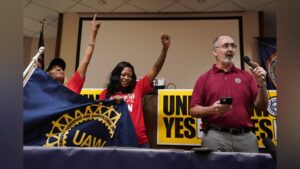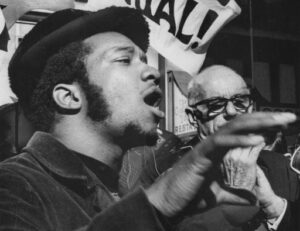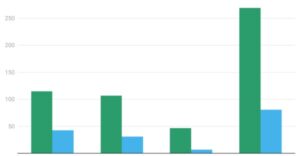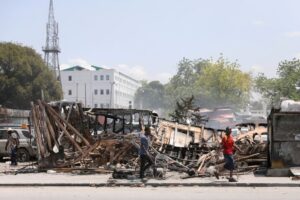Bolivia’s national elections, held October 18, brought an overwhelming victory for the Movement for Socialism (MAS) party that dispatched the right-wing interim government of Jeanine Áñez in the first round. The incoming administration of President-elect Luis Arce and Vice President-elect David Choquehuana will have a MAS majority in the national assembly as well.
The October 2020 election represented a reversal from the results in the October 2019 national election when MAS came in first, but with a much higher support for the opposition. Allegations of MAS-inspired vote tampering, legitimized by an Organization of American States investigation that the OAS that has been widely condemned, provided support for right-wing figures and the military to “suggest” that President Evo Morales step down. This coup led Morales and former Vice President Álvaro García Linera to flee the country while a rump national parliament named right-wing senator Áñez interim president.
As Raúl Zibechi, one of Latin America’s most astute chroniclers of the region’s social movements noted at the time, Morales had also lost much support from his original base in the indigenous social and labor movements. Some of these organizations, including the Central Obrera Boliviana (the main union federation) and the mineworkers union, also called on Morales to stand down. Zibechi’s criticism of Morales brought condemnation from other members of the left who saw nothing more than a U.S.-orchestrated coup behind Morales’s fall.
The Áñez government pledged to hold new elections, while continuing to postpone them for almost a year. While in office, it tried to turn back the clock in Bolivia. In a country with an indigenous and mixed-race majority, the interim government promoted white supremacy. It unleashed the security forces against working-class and indigenous protests. The October elections repudiated the government’s racism.
While most of the international left read the October results as a blow against U.S. imperialism and a desire to restore the status quo ante, Zibechi argues that MAS was able to win because it made some important shifts away fromthe policies of Morales/Garcia Linera to a greater embrace of the social movements that had become alienated from the MAS government.
This article by Zibechi, posted on Correspondencia de Prensa, appeared originally in the Uruguayan newspaper La Brecha. Lance Selfa translated the article into English.
IN HIS initial statements, president elect Luis Arce Catacora struck different notes from those his predecessor, Evo Morales did in his 14 years as president: “We will assemble a government of national unity, we are going to work and we are going to redirect the process of change without hate and learning and overcoming errors as the Movement for Socialism (MAS).”
Those statements embody what the 52 percent of the electorate that voted for the Arce-Choquehuanca ticket feels. Given this overwhelming sentiment, it’s possible that Bolivia will move in a new direction than it did under the Morales-Garcia Linera governments, and especially, than it did in the year that Jeanine Áñez ruled.
Something important took place in the ranks of MAS and, particularly, among the party leadership, that remained in the country during a year wracked with uncertainty while facing racism that the government unleashed against it. The words of MAS’s Eva Copa, the president of the Senate, reflected this change when she said, on news that Evo Morales [in exile in Argentina] will return to the country: “We don’t believe that at this time, he [Morales] has the answers. But with Luis Arce in the lead and with the parliament we have work to do.”
A transparent result
Explaining how MAS, without Morales heading the ticket, took seven percentage points more than it won only a year before requires a deeper dive. On the one hand, as analysts reviewed the results, they placed the Áñez government and Arturo Murillo, the interior minister, at the center of the explanation.
“Áñez was the main organizer of the MAS campaign,” the political scientist Roger Cortez at the Universidad Mayor de San Andrés said in a radio interview, adding that the MAS campaign should “hand out medals to the interior and defense ministers”. Murillo demonstrated the worst features of the interim government that wanted to stay in power for as long as possible. The rejection of Murillo not only came from an important part of the population, but also from several government ministers who resigned in protest of his statements. He was used to threatening and launching investigations against his opponents, journalists, and colleagues who dared to challenge him. The government’s racism and ultra-right positions alienated not only MAS partisans, but also a significant section of the middle class that had opposed Morales in October 2019.
It’s clear that MAS won in the five departments with indigenous majorities: in La Paz, it won more than 68 percent of the vote, in Oruro, 62 percent; in Cochabamba, 65 percent; in Potosí, more than 57 percent and in Chuqisaca, about 49 percent. It also won in Pando, with 45 percent. Carlos Mesa, without much organization but very tied to the right, won in Tarija by 10 points, but in Beni, his margin was smaller.
The geographic polarization is clear, as is the rise of a new radical right. Recall that in the 2014 elections, MAS won 49 percent of the vote in Santa Cruz but, in October, took only 35 percent. That result is the opposite of the trend seen elsewhere in the country since 2019. In that department, the far-rightcandidate Luis Fernando Camacho won comfortably with 45 percent of the vote.
To Cortez, MAS’s victory can be explained by reference to a conservative electorate: conservative not in the ideological sense, but in its support for pragmatism. A good number of voters, he argues, moved to Arce “because of the situation in the country, because, although they knew about all of the shortcomings of the MAS government, they also know and remember the fact that poverty declined and equality improved under its rule.” In short, it voted for what it knew because “Arce offers a greater chance of improving the situation than his opponents do”.
On the other hand, the analyst was not optimistic about the immediate future. He argues that MAS is going to face more powerful enemies than it faced during the election: the coronavirus’s second wave, and an economy with falling income due to declining natural gas exports and slowing oil industry investmentcaused by the unfavorable international situation.
The Choquehuanca factor
The vice president-elect has a long political career. Under the Morales government, he was chancellor (2006-2017). Xavier Albó, a Jesuit priest and well-known expert on indigenous society in Bolivia, even mentioned him as a MAS candidate for president, after the 2016 referendum barred Morales from seeking re-election. Choquehuanca had a long-standing feud with ex-vice president Álvaro García Linera (who nicknamed him “pachamámico” due to his support for indigenous spirituality) and Evo only reluctantly accepted him as the vice presidential candidate under pressure from the social movements, who said they would defend his nomination.
For some, Choquehuanca’s presence on the ticket was key to the sweeping victory. Pablo Solón, ex UN ambassador for the Morales government from 2009 to 2011, wrote starkly on the day after the elections: “MAS didn’t win because of Evo. It won despite Evo. Evo wanted to marginalize David Choquehuanca, who is the candidate chosen by the social movement organizations, mainly those representing indigenous people in the highlands and valleys. The MAS victory was overwhelming in the rural areas of these regions in a large part because of David’s candidacy.”
It was in these areas where MAS recovered the highest levels of support in its history from its low points reached in October 2019. On Election Day, in Oruro, Potosí and La Paz, MAS’s vote increased by 15 to 18 percentage points in only one year. The disastrous Áñez/Murillo government isn’t enough to explain this rebound in support.
Solón records onhis blog that at this year’s MAS convention “the indigenous social organizations of the highlands and valleys took grassroots democratic determination to make Evo back down, because their original position was for‘President David’”. The former diplomat’s conclusion is clear: the election results show that in 2019, MAS could have avoided trouble had it not insisted on Morales’ re-election, an action that went against the 2016 referendum and the country’s constitution. [Translator’s note: In a widely criticized decision seen as contravening the popular will, the country’s Plurinational Constitutional Court overturned the results of the referendum in 2017. The decision cleared the way for Morales to run for re-election in 2019.]
What is certain is that the Choquehuanca factor isn’t an issue of personal popularity, but of a new relation between the top levels of MAS (Morales and García Linera) and the social movement organizations. It is likely that there won’t be the same instances of intimidation and cooptation against the social movements as took place under previous MAS governments. Instead, the internal party fight may seek to corner the new vice president, while assuming that the president won’t intervene.
“Arce is determined to project a different image,” Cortez explained, “but the internal situation in MAS is complicated.” The analyst predicted that the new president may not finish out his five-year term, since internal problems in the government party will unfold during an economic crisis that will notlet up.
Movements and processes of change
The editor of the indigenous(Indianist, i.e. promoting the interests of indigenous people) newspaper Pukara, Pedro Portugal, pointed out that “when Evo Morales stepped down after the elections in 2019, he perceived that popular and indigenous sectors opposed the ex-vice president[García Linera] and were indifferent to his fate.”
Pukarabrings together a good part of the Aymara intelligentsia who are arrayed against García Linera for his role in controlling the Bolivian political process (the ex-vice president heads what the Indianists dismiss as Morales’ “too-white” group of advisers). Choquehuanca moved freely around the Andean world during the electoral campaign, Portugal says. Among other things, Choquehuanca related how, as chancellor, he was discriminated against and excluded by a government in which he was merely considered the “indigenous representative.” His conflict with García Linera, and indirectly with Evo Morales, would have helped him to get along with indigenous sectors who began to take a critical stance towards MAS, says Portugal.
The proof of this is the discussions that Choquehuanca held with Felipe Quispe during the campaign. Quispe is an historic Aymara highlands leader who headed up several blockades in August protestingthe right-wing government’s continued postponement of elections. Days before Election Day, Quispe said that he was planning to vote for MAS to express support for Choquehuanca: “In these elections, we have to vote for our own brothers who are candidates, which is the case with our brother David Choquehuanca”.
Quispe had tense confrontations with Morales during the cycle of protests in 2000-2005, and these increased with the election of the MAS government in 2005. When his son Ayar was assassinated in May 2015 in a plaza in El Alto, he even indirectly accused his old guerrilla comrade, then-vice president García Linera, of being behind the crime.
Surelythe winds of change are blowing against the cadres who headed Evo’s government. MAS youth activists have said that they oppose the immediate return of the ex-president, likening the situation to the rotation of crops in the Andes, “The 20 provinces have proposed that our brother president Evo Morales doesn’t have to return because he still has work to do”.
The rank-and-file of the social movements seem to have arrived at a clear understanding that they cannot follow the same script as before in their relations with the government. The labor activist Oscar Olivera, one of the chief leaders of the 2000 “water wars” that kicked of a cycle of anti-neoliberal protests, said that “the people trust in redirecting the process of change” and that he was supportive of Choquehuanca.
Solón agreed: “The key to relaunching the process of change doesn’t so much lie with the incoming government, but with the capacity for self-government and autonomy of the social organizations and their ability to re-initiate a series of alternative proposals at all levels.” Moreover, he thinks that the demands of 2003, articulated in the October Agenda that inspired Evo’s first government, have run their course. A new strategy is necessary.
A major fact of which to take account in this new period will be the almost inevitable attempts to buy off leaders with government posts—a history that reaches back to the 1952 revolution, reiterating the corruption that has tied political culture and established practicesfor years. This is accentuated by the growth under the MAS governments of what Solón called “the new bourgeoise,” a social class “tied to the state bureaucracy, contracts with the state, business (legal and illegal), the mining cooperatives and the coca leaf production linked to narco trafficking.”
He contends that these new elites will continue having an influence in the government and the party. “The future MAS government is still a space in dispute”. But now the urban and rural grassroots will have a say—those who brought Morales to power, then let him fall, then fought and sacrificed against the racist right until they defeated it. They have accumulated much experience and wisdom, and those will be put to the test in the coming months.
Raúl Zibechi (born January 25, 1952 in Montevideo, Uruguay) is a radio and print journalist, writer, militant and political theorist.




